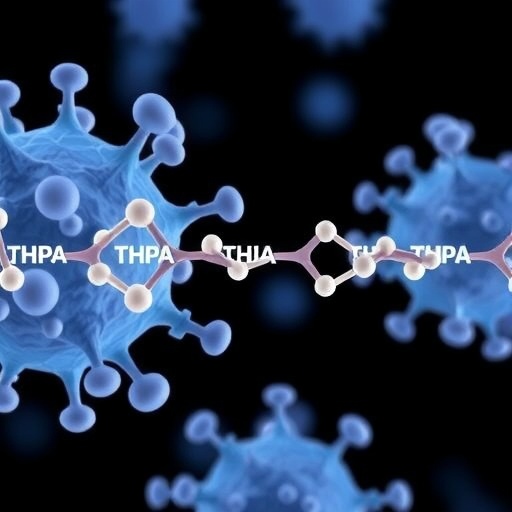In the relentless battle against antimicrobial resistance, the spotlight increasingly falls on Methicillin-resistant Staphylococcus aureus (MRSA), a pathogen that has long evaded conventional treatments. Researchers have rigorously explored new avenues to address this global health crisis, where standard antibiotics often fall short. Recent studies have unveiled promising candidates in the form of short cationic antimicrobial peptides, particularly tetrahydropiperic acid (THPA) conjugates. These peptides display extraordinary potential, demonstrating not only heightened efficacy against MRSA but also an impressive safety profile.
The investigation into THPA conjugates has unveiled a groundbreaking approach to tackling multidrug-resistant bacterial infections. Among various synthesized compounds, three αβ-hybrid peptides stand out due to their design and biological activity: THPA-Lys-tBu-β3,3Ac6c-PEA (referred to as P1), THPA-Orn-tBu-β3,3Ac6c-PEA (P2), and THPA-Arg-tBu-β3,3Ac6c-PEA (P3). Each peptide features a unique amino acid composition, which influences their interaction with bacterial membranes, a crucial factor in their antibacterial effectiveness.
A key highlight of the research is the remarkable performance of peptide P3. In comparative evaluations, this peptide not only demonstrated a minimal hemolytic effect—indicating a favorable safety index—but also exhibited the highest bactericidal activity against MRSA among its counterparts. This is particularly significant, as traditional antibiotics often suffer from toxicity effects that limit their clinical use. Here, peptide P3 emerges as a frontrunner, attracting interest for its dual ability to combat bacteria while preserving host cell integrity.
The research further explores a combinatorial study involving peptide P3 and vancomycin, a last-resort antibiotic for treating severe MRSA infections. The results suggested a synergistic relationship between these two agents, indicating that their combined use could present an enhanced therapeutic strategy for addressing MRSA-related health challenges. The potential implications of this finding are profound, paving the way for a re-evaluation of antibiotic stewardship approaches and combination therapies in clinical settings.
Mechanistic studies provide deeper insight into the interaction between peptide P3 and MRSA. Through sophisticated imaging techniques, researchers observed that peptide P3 induces significant membrane disruption in MRSA cells. This disruption is critical, as it represents a novel mechanism of action that could help circumvent existing resistance pathways. By compromising the structural integrity of the bacterial cell membrane, peptide P3 effectively eliminates its targets, highlighting its utility as a powerful antimicrobial agent.
Moreover, this research contributes to an essential understanding of how synthetic compounds can be tailored to enhance antibacterial properties while minimizing negative side effects. The strategic incorporation of THPA into peptide design illustrates an innovative approach to modulating peptide sequence and structure, ultimately leading to improved therapeutic candidates. As antibiotic resistance continues to evolve, such novel strategies become increasingly vital in developing solutions that remain effective against stubborn pathogens like MRSA.
The implications of this study extend beyond laboratory findings; they touch upon the broader public health landscape. As MRSA infections continue to rise, strains of this resilient pathogen have become prevalent in both healthcare and community settings. The emergence of multidrug-resistant strains necessitates not just new therapeutic options but also a holistic understanding of the mechanisms underlying bacterial survival. By addressing both the efficacy and safety of potential treatments, the exploration of THPA-conjugated peptides paves the way for more viable solutions to combat these infections.
Further research will be necessary to fully elucidate the potential of peptides like P3. This includes understanding their stability in biological systems, bioavailability, and potential implications for human health and safety when administered. Additionally, exploring the broader spectrum of bacterial targets that such peptides might effectively treat could vastly expand their clinical application.
As the research progresses, scientists anticipate that findings will inform future studies aiming to optimize peptide design for even greater potency and selectivity. This iterative process of design, synthesis, and evaluation is crucial as we continue to seek innovative answers to the challenge of bacterial resistance. The future is promising, particularly with the emergence of more refined peptides and the innovative strategies being employed to combat stubborn pathogens like MRSA.
This study not only illustrates a breakthrough in the approach to MRSA treatment but also serves as a clarion call in the quest for novel antibacterial agents. The dynamic nature of bacterial evolution means that we must remain vigilant, proactive, and innovative in our strategies toward infection control. Peptides like P3 represent one of many potential avenues to navigate this complex and critical field of research.
In closing, the research underscores the necessity for continued exploration in the realm of antimicrobial peptides and their applications in clinical settings. Researchers are hopeful that these advances will translate into meaningful clinical outcomes, allowing healthcare providers to offer better, safer, and more effective treatments for patients suffering from MRSA infections. The fight against antimicrobial resistance is far from over, but with innovations like THPA conjugated peptides, there is a renewed sense of hope and potential in the ongoing battle against these formidable microorganisms.
Subject of Research: Development of antimicrobial peptides targeting MRSA infections.
Article Title: Antibacterial activity and mechanism of optimized THPA conjugated dipeptides against methicillin-resistant Staphylococcus aureus.
Article References:
Rathore, A., Rashid, B., Sarkar, A.R. et al. Antibacterial activity and mechanism of optimized THPA conjugated dipeptides against methicillin-resistant Staphylococcus aureus.
J Antibiot (2025). https://doi.org/10.1038/s41429-025-00877-w
Image Credits: AI Generated
DOI: 10.1038/s41429-025-00877-w
Keywords: Antimicrobial peptides, MRSA, THPA conjugates, bacterial resistance, peptide synthesis.




